The last round will decide the other three spots.
IM Michael Rahal – Berlin, February 9th 2022 – Today’s round in the Berlin Grand Prix began with a bit of drama. The President of the German Chess Federation, Ullrich Krause, had been invited to execute the first “ceremonial” move on GM Vincent Keymer’s board. However, while fifteen of the sixteen players were already firmly seated, most of them fully concentrated, Keymer’s opponent – GM Levon Aronian – had yet to appear.
The signs of relief on Chief Arbiter Ivan Syrovy’s face when Aronian finally stepped into the playing venue at exactly 14.59 were clearly visible. The former Armenian player, now representing the USA, greeted his opponent and awaited 1.d4, in this case, played by Krause, and the round was on.

And an exciting round it was! Four wins and four draws in an eight-player round-robin is a remarkable statistic. In addition, Aronian’s win over Keymer qualifies the USA competitor to the semifinals, while Esipenko and Dominguez scored important wins with Black that allow them to keep their qualifying chances intact for tomorrow’s final round.
Pool A
Trailing Hikaru Nakamura by half a point, but playing Black, Alexander Grischuk had a really difficult task ahead of him. His opening choice, the double-edged King’s Indian Defence, definitely seems the way to go to fight for a win. However, after Nakamura’s 6.Be3 – the Semi-Averbakh variation, a fitting choice as the legendary Russian Grand Master turned 100 yesterday – Grischuk plunged into deep 15-minute thought.
He finally decided to follow the main line but around move twenty, he was already down to his last twenty minutes, a startling contrast to Nakamura’s one hour twenty. At the critical moment, Nakamura transferred his bishop to b2, zeroing in on Grischuk’s king, already weakened on the dark squares thanks to an early h-pawn push by the American.

With hardly any thinking time and facing a direct attack, the Russian buckled under the pressure – his position crumbled, leaving Grischuk out of the race for qualification. Asked by Press Officer Michael Rahal what could he take away from the game, his reply, as usual, wasn’t disappointing: “I probably have to stop playing the King’s Indian”, finding some light humour in a desperate tournament moment.
In the other game of the A-pool, Andrey Esipenko had no other chance but to shoot his last bolt to defeat the last-placed competitor of the group, Etienne Bacrot. He was probably going to play the Marshall Attack, but Bacrot nipped that idea in the bud, deciding on a solid anti-Marshall line with a rapid exchange of queens.
The game remained mainly balanced until Bacrot played 27.Bc4. Esipenko grabbed the chance to plant his rook on d4 and began to advance his kingside pawns, eventually creating a passed g-pawn that ultimately decided the game in his favour. In his postgame interview, Bacrot said that he had been quite lazy in his calculations and should never have fallen into this passive endgame position.

Esipenko was obviously very happy with the outcome and will now have White against Nakamura in the last round: whoever wins will qualify to the semifinals, but Nakamura also advances with a draw.
Pool B
The first game of the afternoon to finish was a quick affair. Playing with White against the co-leader of the group, Radoslaw Wojtaszek decided to play it safe. Slightly surprised by his opponent’s opening choice, Radek recognized in the postgame interview that he had missed 18…Rc4 and that he even thought that he was slightly worse, given which he decided to initiate mass exchanges leading to a three-fold repetition in a completely level position.
Although Vladimir Fedoseev still has to face (with White) Rapport in the last round, his solid opening choice clearly indicates that a draw was a good result for him today.

Meanwhile, in the other game, Grigoriy Oparin repeated the Tarrasch variation he already played in the third round. When the pawn structure stabilized, he found himself with another isolated d-pawn position which he seems to enjoy defending: a weak pawn but in exchange for active piece play.
However, when things seemed to be going well for Richard Rapport, he missed 23…Ng3 and had to take on the defensive. Oparin started piling on the pressure and gradually increased his advantage in the endgame.
On move 41, just after the time control, Oparin missed a great opportunity to win on the spot with 41…Re2+ before capturing the pawn on f2. In the postmortem on the board, both players thought that it was a draw, but further analysis seemed to confirm the win for Black.
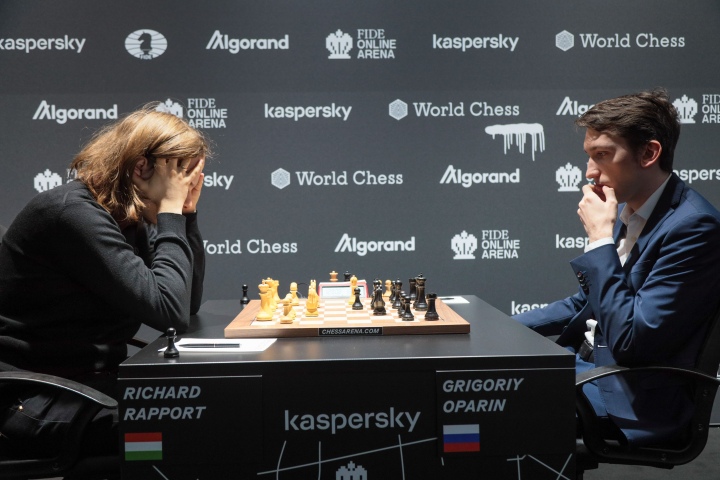
These results leave everything open for the last round: a very exciting and interesting tournament situation where the winner of the game between Fedoseev and Rapport could easily win a spot in the tiebreaks.
Pool C
Possibly inspired by the President of the German Chess Federation’s first move, Vincent Keymer went all-out for Aronian’s throat in today’s game. Trailing the leader by two points but playing with the white pieces, Keymer went for a crazy pawn-grab in the solid Ragozin Defence (13.Nxe5 instead of the prudent 13.0-0), allowing his opponent to force his king into the center with hardly any protection.
An unrelenting battle began, with players attacking with heavy shots such as 17.g4, 17…g5 and 18.b4. Computer analysis indeed confirmed that the players were finding the best moves, but White’s position seemed to be always hanging by a thread.
Things remained tactically balanced until Keymer blundered big with 29.Rh5? (29.f3 was still equal according to the computer). Aronian seized the moment, capturing the two center pawns, and the game was over.
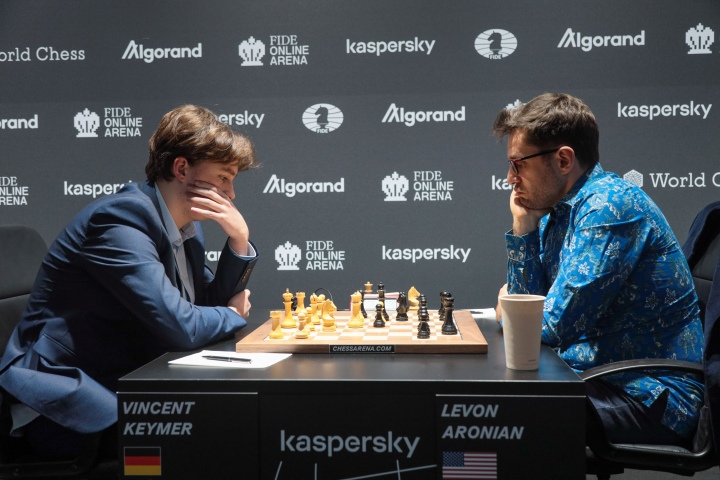
In the postgame interview, both players mentioned that they had analyzed the position after 13.Nxe5 some time back, but it was hard to remember the various lines.
In the other game of the group, both Vidit Gujrathi and Daniil Dubov, tied on two points out of four, faced their last opportunity to win a full point and catch Aronian. A Tarrasch defence transposed into a sideline of the Queen’s Gambit Accepted.
Although Dubov declared that he had spent the rest day sleeping, he had also prepared a popular piece sacrifice, but Vidit had it all under control, improving with 16… 0-0 an earlier game played in the same line by Alexandru David in 2021. The position remained equal: Dubov targeted Black’s kingside with his bishops and major pieces while Vidit tried his best to exchange rooks on the c-file.
In his interview after the game, Dubov sensed that he might have had better chances on the kingside, but even so, and after many exchanges, White still ended up with the bishop pair and an outside passed a-pawn. However, one of his bishops was trapped on h6, and while Vidit tried to round it up, Dubov pushed his passer. After a couple of pawn exchanges, a draw was agreed upon in a balanced position.
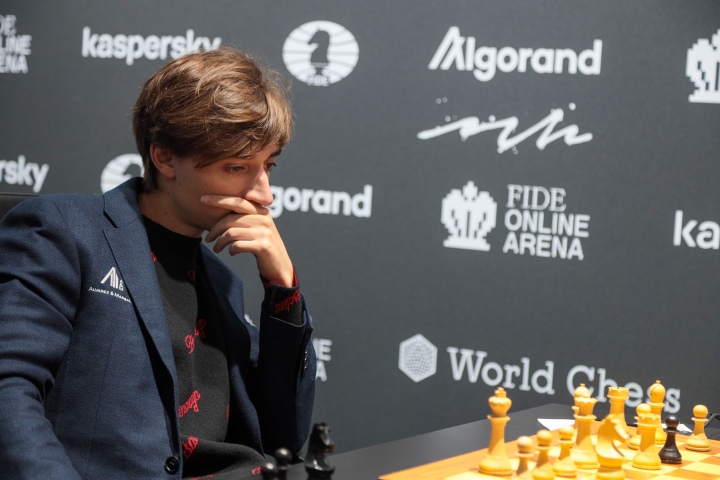
Unfortunately for the two players, this result allows Aronian to qualify to the semifinals with a round to spare. Nonetheless, it was an exciting game, although as Vidit put it, “especially exciting for Aronian”.
Pool D
Leading the pack by a full point, Wesley So also decided to play it safe today. Facing Alexei Shirov, a very dangerous opponent with White, the American opted for the solid Berlin Defence, always a good choice if you’re playing in Germany, or more specifically Berlin, as Shirov was quick to point out in the press interview after the game.
They followed a recent 2021 game between Maxime Vachier-Lagrave and Aronian until Shirov’s novelty 16.Nf5 – Vachier-Lagrave played 16.Rfe1 – but that only led to more exchanges, and soon the position petered out into a totally equal ending. A draw was agreed on move 31 after a three-fold repetition.
In his postgame interview, Wesley mentioned that he had prepared for this game over five hours on the rest day, but he had learned by experience that generally, you shouldn’t spend so much time on preparation.
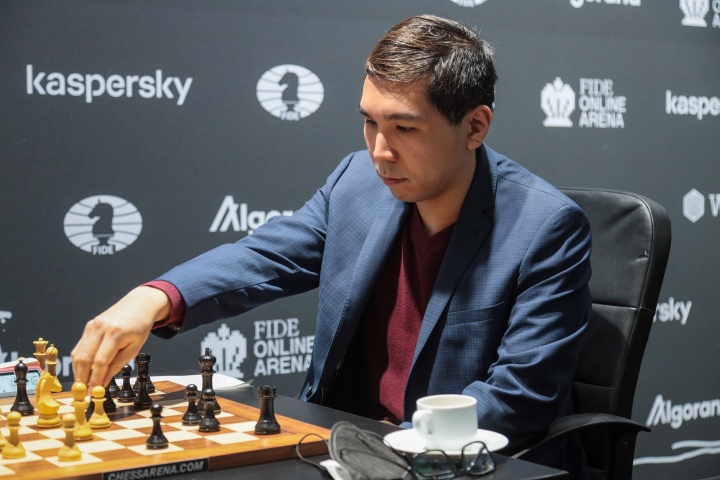
Trailing So with 2/4, both Pentala Harikrishna and Leinier Dominguez had the last chance to make something work to catch the American on the top of the scoreboard. Dominguez went for his beloved Sicilian, but Harikrishna had prepared a sideline in the Alapin system – 4.Bc4 – which has gained some traction recently.
Visibly surprised, Dominguez spent more than fifteen minutes to recall his analysis. After the opening phase, the position resembled more a mix of the Caro-Kan and the French than a Sicilian: a reminder to all chess fans that understanding structures is more important than memorizing openings.
The online commentators suggested that maybe Harikrishna missed a good chance to seize the initiative with 22.g4. Some interesting queenside tactics followed, and Dominguez came out ahead in a typical French ending and effortlessly converted his advantage. Devastated, Harikrishna recognized in the postgame interview that maybe he had to calculate more precisely instead of just moving pieces around.
This result gave Dominguez a theoretical chance to overtake So in the last round, or at least force a tiebreak, all depending on tomorrow’s results.
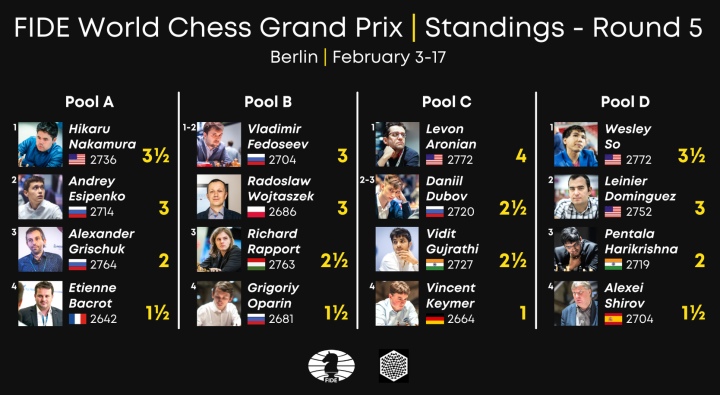
About the Tournament
The three-tournament Grand Prix series, which will unfold from February to April, features twenty-four of the world’s best Grandmasters, who will compete in two of the three events. In order to make the series more exciting and reduce the percentage of draws, FIDE and World Chess have changed the format.
This innovative approach is new for the chess world but very similar to the Super League: the first stage has four pools of four players, and the winner of each pool advances to the semifinals and then to the final.
The venue of the first leg is the World Chess Club Berlin, located at the City Centre on Unter den Linden, 26-30, and the games will be played from February 4th-17th every afternoon at 3 pm. Along with the two qualification spots for the Candidates, the event has a 150.000 euros prize fund, 20.000 euros more than the 2019 series.
All the games will be broadcasted live with expert commentary in three languages at https://chessarena.com/broadcasts/13604 More information and the full schedule can also be found on the worldchess.com website. Full pairings can be found here.
Due to COVID restrictions currently in place, only a limited number of tickets are available. Please note that the 2G+ rule applies to the event, which means that visiting the venue is only possible for those who either have a complete vaccination with EU-certified vaccine or proof of recovery and can additionally present a booster dose certificate or a negative test result.
Leading companies supporting the FIDE Grand Prix Series 2022 include:
Kaspersky as the Official Cybersecurity Partner
Algorand as the Official Blockchain Partner
Prytek as the Technology Transfer Partner
FIDE Online Arena as the official Partner
For further questions, please contact: media@worldchess.com
Text: IM Michael Rahal
Photo: Official Photo FIDE Grand Prix Berlin Press Kit
About World Chess
World Chess is a London-based chess gaming and entertainment group and FIDE’ official broadcaster and commercial partner. World Chess organized the FIDE Championship Matches in Russia, the USA, and the UK, and revolutionized the sport by signing the biggest media partnerships in history. World Chess develops Armageddon, the chess league for prime-time television. World Chess also runs FIDE Online Arena, the exclusive official chess gaming platform. More at worldchess.com.
About Kaspersky
Kaspersky is a global cybersecurity and digital privacy company founded in 1997. Kaspersky’s deep threat intelligence and security expertise are constantly transforming into innovative security solutions and services to protect businesses, critical infrastructure, governments and consumers around the globe. The company’s comprehensive security portfolio includes leading endpoint protection and a number of specialized security solutions and services to fight sophisticated and evolving digital threats. Over 400 million users are protected by Kaspersky technologies, and we help 240,000 corporate clients protect what matters most to them. Learn more at www.kaspersky.com.
About Algorand:
Algorand is building the technology to power the Future of Finance (FutureFi), the convergence of traditional and decentralized models into a unified system that is inclusive, frictionless, and secure. Founded by Turing Award-winning cryptographer Silvio Micali, Algorand developed a blockchain infrastructure that offers the interoperability and capacity to handle the volume of transactions needed for financial institutions and governments to smoothly transition into FutureFi. The technology of choice for more than 700 global organizations, Algorand is enabling the simple creation of next-generation financial products, protocols and exchange of value. For more information, visit www.algorand.com.
About Prytek
The Prytek Group combines technology companies and services companies to create a new asset class. We build legacy service businesses and combine them with deep tech technologies to increase margins. We buy out entire operations and create efficiency and scalability through our technologies. The group is divided into a Corporate Arm – which comprises of controlled companies, and an Investment Arm – which acts as a VC and PE fund of the Group. The goal of the Corporate Arm is to generate consolidated cash with a legacy vision, while the Investment Arm is to develop products for our operations and generate profit via equity value growth and exit at a high valuation.
Prytek Building Technologies, Delivering Managed Services. Prytek: www.prytek.com
About FIDE Online Arena
FIDE Online Arena is the exclusive online chess gaming platform that awards online ratings recognized by FIDE. It hosts rated tournaments and games 24 hours per day. The platform runs an advanced fairplay engine. Play official games at chessarena.com.

